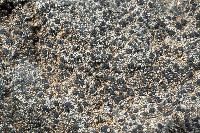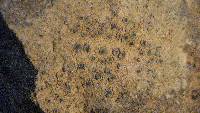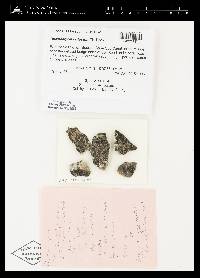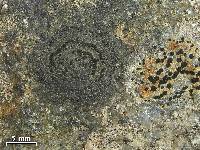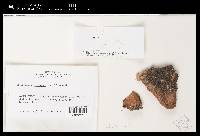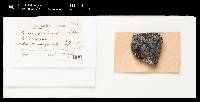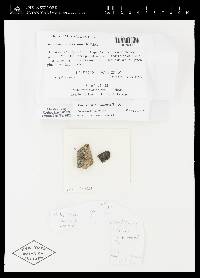
- Home
- Search
- Images
- Species Checklists
- US States: O-Z >
- US National Parks
- Central America
- South America
- US National Parks
- Southern Subpolar Region
|
|
|
|
Family: Rhizocarpaceae
[Rhizocarpon obscuratum f. reductum (Th. Fr.) Schade, moreRhizocarpon obscuratum var. reductum (Th. Fr.) Eitner] |
Global occurrence: Oceania – Australasia | Eurasia – Europe | Americas – North America (incl Mexico) | Antarctic – Southern Subpolar Islands, Subantarctic Islands. Substrate: rock – siliceous, siliciferous, acidic. Life habit: lichenized (mutualistic with algal photobionts). Thallus: crustose (crustaceous) – episubstratal – unspecified ; cracked, fissured, fractured, rimose | compartimentized – areolate, squamulate; [th] upper surface: grey(ish) | brown(ish) (if pale: fawn, tan; if mid: cinnamon); [th marginal and upper surface] specific structures: absent; [th] morphol substructures (eg areoles, lobes, branches) width [mm]: (low) 0.2 (high) 0.4; [th] morphol substructures (eg areoles, lobes, branches) upper surface: smooth, plane | subsquamulose. Ascomata: absent | present; ascoma: apothecial, apothecioid – hymenial; ascoma [mm]: (min) 0.2 (low) 0.4 (high) 0.6 (max) 0.8; ascoma: immersed, innate | subsessile, subimmersed, adnate, semi-immersed, emergent | sessile, superficial; [ascm, if apoth] disc, mazaedium: plane, flat, flattened, expanded | subconvex, slightly convex | convex | distinctly convex; [ascm, if apoth] disc, mazaedium: black(ish); [ascm, if apoth] margin surface; [if perith] periostiolar area, ostiole, involucrellum: black(ish); [ascm, if apoth] subhymenial layers, hypothecium; [if perith] basal excipulum: brown(ish) (if pale: fawn, tan; if mid: cinnamon); [ascm] paraphyses/-oids: present; [ascm] paraphyses/-oid cells width [µm]: (median) 1.0; [ascm] epihymenium, epithecium: brown(ish) green (olivaceous, olive green). Asci: lecanoralean; [asc] tholus: thickened; [asc] tholus amyloidity (iodine reaction): present; [asc] tholus amyloidity pattern: with amyloid cap (= Icmadophila-, Lecidea-, Pertusaria-types etc). Ascospores: (median) 8.0; [asp] length [µm]: (min) 17.0 (low) 18.3(median) 21.6 (high) 25.0 (max) 30.0; [asp] width [µm]: (min) 8.0 (low) 9.5(median) 10.8 (high) 12.0 (max) 13.5; [asp] septa: present; muriformly septate – muriform, submuriform; [asp] transversal septa: (low) 4.0 (high) 6.0; [asp] pigmentation: hyaline, colourless; [asp] perispore, epispore: thick, distincly halonate. Secondary metabolites: absent | present, norstictic acid | stictic acid. Primary photobiont: present, chlorophytaceous – trebouxiaceous, chlorococcoid. Secondary photobionts (eg in cephalodia): absent. |
|
|
|





